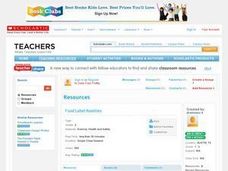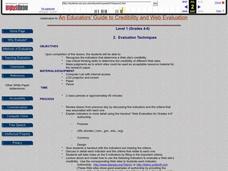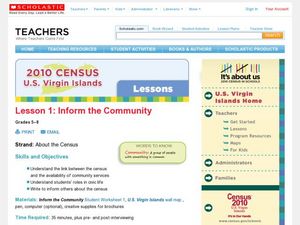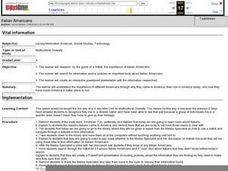Curated OER
Ethics WebQuest
Students examine the topics of copyright and fair use, plagiarism, and evaluating websites for content. They conduct Internet research, evaluate a variety of websites for authenticity, and write about and define plagiarism and copyright...
Curated OER
Biosecurity Keeps Everyone Safe
Students evaluate websites and determine whether they are valid or invalid resources regarding the topic of infectious diseases and animals. They explore a variety of websites, write a research paper about biosafety, and complete a...
Curated OER
Presentations 'How To 10 Steps - WordPerfect (IT)
Learners create a 10-Step slide show describing "How To" make or assemble something. They explore the relationship and impact of information technology and digital media in the business arena. They plan, design, and organize a...
Curated OER
Lesson 4- Arthur Meets the President
Students create a pamphlet. In this story evaluation instructional activity, students complete a story evaluation on Washington, D.C., create a pamphlet on Washington, D.C., and then discuss the most interesting thing they learned.
Curated OER
Note taking on Sources Other Than Text
Students examine different sources of information. They evaluate and take notes from a variety of sources.
Curated OER
Emergency Preparedness
Learners take a closer look at emergency preparedness plans. In this writing skills lesson plan, students evaluate the severe weather, natural disaster, and threat plans in place at their school and then write their own improved...
Curated OER
Waterfalls
Third graders practice identifying the main idea and supporting details when reading informational text. They read text related to waterfalls and practice note taking skills to identify critical details. Students use their notes to...
Curated OER
Food Pyramid Menu
Young scholars analyze the food pyramid. For this food pyramid lesson, students evaluate their nutritional needs. Young scholars record their eating habits and determine if their food choices were healthy.
Curated OER
Weather "Why"
Students research weather and explore how to use their research information. In this weather information lesson, students visit a given website for weather forecasts. Students graph the weather, sing weather songs and select a class...
Curated OER
Food Label Realities
Second graders identify nutritional information on food labels. In this nutrition lesson, 2nd graders bring in food labels from home and practice reading them. Students discuss the nutritional content, such as caloric content. Students...
Curated OER
New Perspectives on Ancient Ireland
Students conduct Internet research on the history of ancient Ireland. They create a rubric for evaluating information sources. Students synthesize information from varied sources to create a research-based presentation. They explore...
Curated OER
Sports Injuries
Students study sports injuries in relation to famous athletes and everyday people. They brainstorm common sports injuries and those of famous athletes. In groups, they evaluate information related to sports injuries and take notes to...
Pennsylvania Department of Education
Use Order of Operations to Evaluate Expressions—No Grouping Symbols
Students identify and explain different types of data collection and graphs. For this graphs and data collection lesson, students record their observations of a variety of data collection tools and graphs displayed in the room. Students...
Curated OER
Harriet Tubman: An Informative and Impressionistic Look
Students examine artwork depicting Harriet Tubman. In this Harriet Tubman lesson, students review her life and how she impacted the Underground Railroad. Students view impressionistic artwork showing her life. Students then create their...
Curated OER
Analyzing and Evaluating Holocaust Literature
Students examine the history of the Holocaust through literature. Using different pieces of literature, they critique the items in terms of being historical accurate and its value in telling the stories of the Holocaust. They create a...
Curated OER
Evaluation Techniques
Students study the indicators that determine a Web site's credibility.
Curated OER
Inform the Community
Students gain an understanding of the U.S. Census. In this social studies civics lesson plan, students explore understand the link between the census and the availability of community services.
Curated OER
Understanding URLs
Study the different domain suffixes in web address becoming familiar with the types of organization that each suffix indicates. They evaluate web site using specified criteria.
Maine Content Literacy Project
Introduction to Literacy Criticism
As learners continue to examine a short story of their choice, they take some time to look at analysis completed by others on the same story. In the eleventh lesson in a series of fourteen, pupils explore various sites for literary...
Curated OER
ReReading America Lesson Three: Hands-on Practice
Learners research, using a variety of sources, a topic that has been previously chosen. They evaluate their information for the value, relevance, and accuracy. Students identify problems in their research and writing to get assistance as...
Curated OER
Let's Dig Deeper!
Students investigate rocks and how they are formed and the uses man has for rocks. The topic is narrowed, researched, and documented by three sources. The results are presented to classmates for evaluation.
Curated OER
Italian Americans
Fourth graders research the importance of Italian Americans and search for information and pictures about them. They create an interactive PowerPoint presentation to present to the class.
Curated OER
Check it Out...Nonfiction Can Be Fun!
Organizing information gathered for a research topic can be a challenge. Read aloud notes you have collected on a topic and use suggestions offer by the class to categorize and sort this information. Partners then follow this pattern,...
Curated OER
Out of the Dust: Questioning Strategies
Bloom's Taxonomy is a great way to address the many levels of comprehension. With explanations and examples of each level, you can create questions that focus on knowledge, comprehension, application, analysis, synthesis, and evaluation.

























